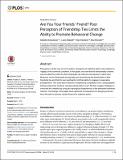| dc.contributor.author | Almaatouq, Abdullah | |
| dc.contributor.author | Radaelli, Laura | |
| dc.contributor.author | Pentland, Alex Paul | |
| dc.contributor.author | Shmueli, Erez | |
| dc.date.accessioned | 2017-05-05T23:27:50Z | |
| dc.date.available | 2017-05-05T23:27:50Z | |
| dc.date.issued | 2016-03 | |
| dc.date.submitted | 2015-11 | |
| dc.identifier.issn | 1932-6203 | |
| dc.identifier.uri | http://hdl.handle.net/1721.1/108718 | |
| dc.description.abstract | Persuasion is at the core of norm creation, emergence of collective action, and solutions to ‘tragedy of the commons’ problems. In this paper, we show that the directionality of friendship ties affect the extent to which individuals can influence the behavior of each other. Moreover, we find that people are typically poor at perceiving the directionality of their friendship ties and that this can significantly limit their ability to engage in cooperative arrangements. This could lead to failures in establishing compatible norms, acting together, finding compromise solutions, and persuading others to act. We then suggest strategies to overcome this limitation by using two topological characteristics of the perceived friendship network. The findings of this paper have significant consequences for designing interventions that seek to harness social influence for collective action. | en_US |
| dc.language.iso | en_US | |
| dc.publisher | Public Library of Science | en_US |
| dc.relation.isversionof | http://dx.doi.org/10.1371/journal.pone.0151588 | en_US |
| dc.rights | Creative Commons Attribution | en_US |
| dc.rights.uri | http://creativecommons.org/licenses/by/4.0/ | en_US |
| dc.source | Public Library of Science | en_US |
| dc.title | Are You Your Friends’ Friend? Poor Perception of Friendship Ties Limits the Ability to Promote Behavioral Change | en_US |
| dc.type | Article | en_US |
| dc.identifier.citation | Almaatouq, Abdullah, Laura Radaelli, Alex Pentland, and Erez Shmueli. “Are You Your Friends’ Friend? Poor Perception of Friendship Ties Limits the Ability to Promote Behavioral Change.” Edited by Zi-Ke Zhang. PLoS ONE 11, no. 3 (March 22, 2016): e0151588. | en_US |
| dc.contributor.department | Massachusetts Institute of Technology. Institute for Data, Systems, and Society | en_US |
| dc.contributor.department | Massachusetts Institute of Technology. Center for Computational Engineering | en_US |
| dc.contributor.department | Massachusetts Institute of Technology. Department of Civil and Environmental Engineering | en_US |
| dc.contributor.department | Massachusetts Institute of Technology. Media Laboratory | en_US |
| dc.contributor.department | Massachusetts Institute of Technology. Computation for Design and Optimization Program | en_US |
| dc.contributor.department | Program in Media Arts and Sciences (Massachusetts Institute of Technology) | en_US |
| dc.contributor.mitauthor | Almaatouq, Abdullah | |
| dc.contributor.mitauthor | Radaelli, Laura | |
| dc.contributor.mitauthor | Pentland, Alex Paul | |
| dc.contributor.mitauthor | Shmueli, Erez | |
| dc.relation.journal | PLoS ONE | en_US |
| dc.eprint.version | Final published version | en_US |
| dc.type.uri | http://purl.org/eprint/type/JournalArticle | en_US |
| eprint.status | http://purl.org/eprint/status/PeerReviewed | en_US |
| dspace.orderedauthors | Almaatouq, Abdullah; Radaelli, Laura; Pentland, Alex; Shmueli, Erez | en_US |
| dspace.embargo.terms | N | en_US |
| dc.identifier.orcid | https://orcid.org/0000-0002-8467-9123 | |
| dc.identifier.orcid | https://orcid.org/0000-0002-8053-9983 | |
| dc.identifier.orcid | https://orcid.org/0000-0002-0346-2994 | |
| mit.license | OPEN_ACCESS_POLICY | en_US |
| mit.metadata.status | Complete | |
